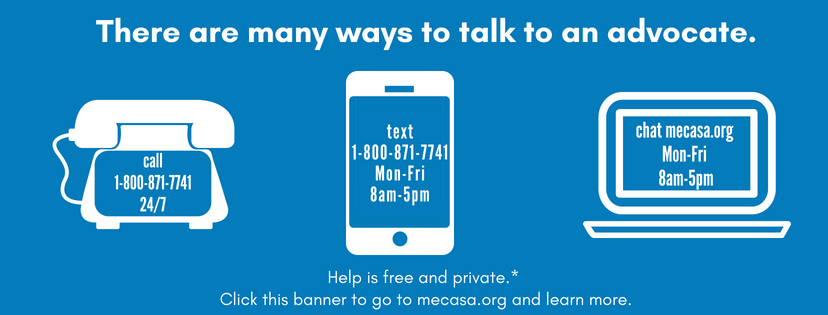Maine advocates can help.Advocates at Maine's sexual assault support centers help people who have been sexually harassed or assaulted. They are trained to know how to help you figure out what to do - if you want to do anything - next. What they do and how you can contact them is detailed below.
|
How can an advocate help me?
|
Advocates are trained to support people who have been sexually harassed. Advocates can:
Explain your options Give emotional support to you (and other friends/family members, if needed) Go with you if you decide to make a report or take legal action Help you fill out any paperwork Help you find other help, like a therapist or a lawyer, in your community if you want it Any help you get from an advocate is confidential, which means that what you talk about with them is private. They will not tell your employer that you contacted them. You do not have to give your name or any other information about yourself to get help. Some people aren't sure if what is happening to them is sexual harassment. Advocates can help you talk through that, too. Who are advocates & are they in Maine?An advocate is a professional who has taken a lot of training to support you in many different ways, including emotional support, help figuring out what you can do next, and much more. When you contact an advocate, you are speaking to someone who is in Maine and knows how to help you in your community.
|
Just want legal advice?Unsure who to turn to for legal advice? Wondering if you are eligible for pro bono representation? If you want to talk to a lawyer, you have a few options. The Maine Human Rights Commission has a list of lawyers who handle cases at the Commission. You can find it here. You can also call the Maine Bar Association and ask for an employment lawyer. Pine Tree Legal Assistance may be able to help with certain types of cases. Advocates can help you figure out if Pine Tree can help, and can make a referral to them. |
There are advocates at Maine's sexual assault and harassment support centers who answer the 1-800-871-7741 calls and texts and the chat through mecasa.org. There are advocates at the Immigrant Resource Center of Maine who speak many different languages and provide culturally specific help to immigrants and refugees. There are also advocates in Maine's tribal communities who are part of the Wabanaki Women's Coalition, where they help people in a way that honors Wabanaki values and sovereignty.
Who answers my call/text/chat?
Monday-Friday from 8am-5pm, an advocate who is trained to help you will answer your call, text, or chat. Anytime outside of those hours, you can call
1-800-871-7741 and an answering service will connect you with an advocate.
If you call the Immigrant Resource Center of Maine you will speak with an advocate trained to help who is also part of Maine's immigrant and refugee community. If you call one of the member programs of the Wabanaki Women's Coalition, you will speak to an advocate who is trained to help you in a way that honors Wabanaki values and sovereignty.
For more information about what an advocate can do, see "How Can An Advocate Help Me?" above.
1-800-871-7741 and an answering service will connect you with an advocate.
If you call the Immigrant Resource Center of Maine you will speak with an advocate trained to help who is also part of Maine's immigrant and refugee community. If you call one of the member programs of the Wabanaki Women's Coalition, you will speak to an advocate who is trained to help you in a way that honors Wabanaki values and sovereignty.
For more information about what an advocate can do, see "How Can An Advocate Help Me?" above.
How do I get in touch with an advocate?
To contact the Immigrant Resource Center of Maine, visit their website or call 207-753-0061.
To contact the member programs of the Wabanaki Women's Coalition, visit their website or call the Native Helpline at 1-844-7NATIVE.
To contact the member programs of the Wabanaki Women's Coalition, visit their website or call the Native Helpline at 1-844-7NATIVE.
*Advocates are what is called mandated reporters. That means they have to follow Maine's abuse reporting laws. If an advocate thinks you are under 18 and you tell them any information that makes them think you are being abused or neglected, they may have to share this with other adults to help keep you safe. But, they will never ask you for identifying information. You can share what you feel comfortable sharing.
What if I have more questions about advocates?
You can contact the Maine Coalition Against Sexual Assault and they can answer your question.

